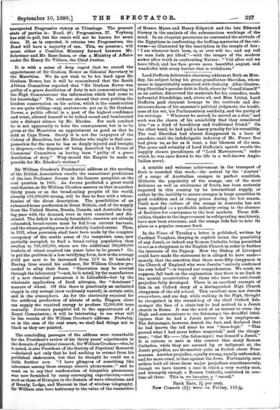In the Times of Tuesday a letter is published, written
by Cardinal Vaughan, denying in explicit terms the possibility of any Jesuit, or indeed any Roman Catholic, being permitted to act as a clergyman in the English Church in order to farther the interests of the Papacy. How the Bishop of Liverpool could have made the statement he is alleged to have made— namely, that the assertion that there were fifty clergymen in the Church of England who were Jesuits "entirely confirmed his own belief "—is beyond our comprehension. We must, we suppose, fall back on the explanation that there is no limit to the mental eccentricities of those who have the anti-Jesuit prejudice fully developed. There is an excellent example of this in an Oxford story of a distinguished High Church clergyman of the old school. This excellent man saw Jesuits everywhere, and one day, while walking in the High, thought he recognised in the errand-boy of the chief Oxford fish- monger the face of a choir-boy he had noticed in a Jesuit church in Rome. It was the work of an instant to cross the High and communicate to the fishmonger the dreadful intel- ligence that he had a Jesuit novice in his employment. The fishmonger, however, denied the fact, and declared that he had known the lad since he was "knee-high." "This proved what I had never before suspected," said the clergy- man; "that Mr.— [the fishmonger] was himself a Jesuit." It is curious to note in this context that many Roman Catholics, while they are amused by, or indignant at, the Jesuit prejudice, are themselves quite as foolish about Free- masons. Another prejudice, equally strong, equally unfounded, and far more cruel, is that against the Jews. Fortunately, men seldom hold all these three major prejudices simultaneously, though we have known a case in which a very worthy man, and strangely enough a Roman Catholic, contrived to com- bine all three. This is, we imagine, a "record."


































 Previous page
Previous page